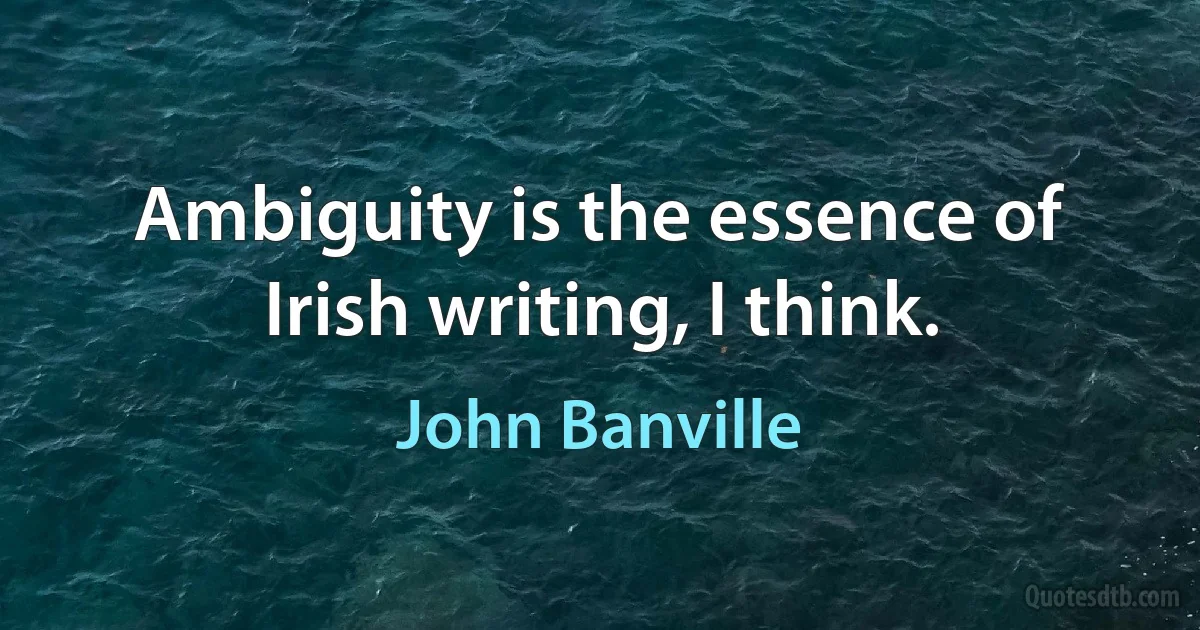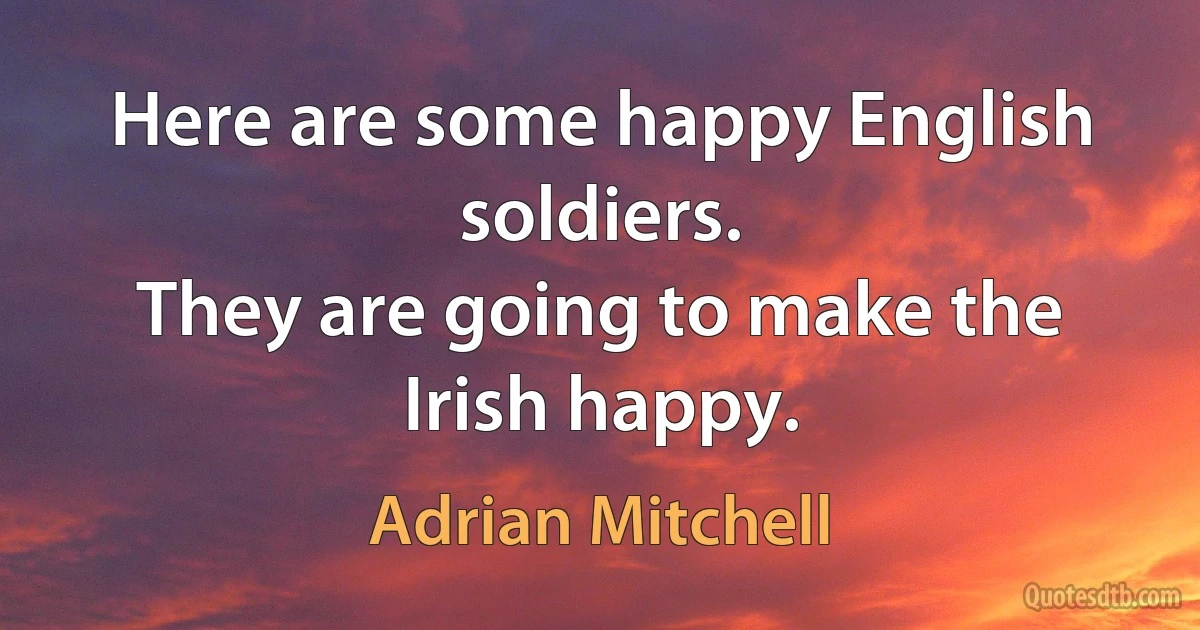Irish Quotes - page 8
A boy in his teens! What did I know about death? This is a problem for Irish writers - our literary forebears are enormous. They stand behind us like Easter Island statues, and we keep trying to measure up to them, leaping towards heights we can't possibly reach. I suppose that's a good thing, but it makes for a painful early life for the writer. Anyway, hunched there over my Aunt Sadie's Remington, I was starting to learn how to write. Now, fifty years later, I'm still learning.

John Banville
The people are beginning to fear that the Irish Government is merely a machinery for their destruction; that, for all the usual functions of Government, this Castle-nuisance is altogether powerless; that it is unable, or unwilling, to take a single step for the prevention of famine, for the encouragement of manufactures, or providing fields of industry, and is only active in promoting, by high premiums and bounties, the horrible manufacture of crimes!

John Mitchel
The first act of my public life was to publish my views and opinions of the evils under which Ireland laboured, and that subject is one that, amidst all the public questions in which I have been engaged, I have always had deeply and painfully at heart. I know I am taunted by some of my friends with giving a bad vote on this occasion. I shall give a conscientious vote, and if in doing so I am to make personal sacrifices, and lose the good opinion of those with whom I have long acted and have a deep respect for, I shall regret it; but, next to the satisfaction of having acted conscientiously, will be that I shall feel in voting for that which I believe will tend to heal the festering wounds of Irish society.

Richard Cobden
I appeal to history. Among the generals of Washington in the Revolutionary War were Greene, Putnam, and Lee, who were of English descent; Wayne and Sullivan, who were of Irish descent; Marion, who was of French descent; Schuyler, who was of Dutch descent, and Muhlenberg and Herkimer, who were of German descent. But they were all of them Americans and nothing else, just as much as Washington. Carroll of Carrollton was a Catholic; Hancock a Protestant; Jefferson was heterodox from the standpoint of any orthodox creed; but these and all the other signers of the Declaration of Independence stood on an equality of duty and right and liberty, as Americans and nothing else.

Theodore Roosevelt
There has been a great deal of talk about raising class prejudice. I dislike class prejudice. ... There has been no feeling of class prejudice in my mind; but, my Lords, there is a worse thing than class prejudice, and that is race or national prejudice. We have not had much of it, in fact I may say almost none of it, here. Still is it not true that the cry which is going to be loudly invoked in this election, the Irish cry, depends upon race and national prejudice? Talk of class prejudice. The classes will take care of themselves, I trust. The English working man in my view-and I represented a great and important group of them for many years-is not in the least a Phrygian with a red cap, though some of his fellows may talk in that vein.

John Morley, 1st Viscount Morley of Blackburn
It is only in the case of musical instruments that I find any commendable diligence in the [Irish] people. They seem to me to be incomparably more skilled in these than any other people that I have seen. The movement is not, as in the British instrument to which we are accustomed, slow and easy, but rather quick and lively, while at the same time the melody is sweet and pleasant. It is remarkable how, in spite of the great speed of the fingers, the musical proportion is maintained. The melody is kept perfect and full with unimpaired art through everything – through quivering measures and the involved use of several instruments – with a rapidity that charms, a rhythmic pattern that is varied and a concord achieved through elements discordant.

Gerald of Wales
Nothing relieves Irish despair. The Irishman's complaint lies not with his circumstance, which might be rendered brilliant by labour or luck, but with injustice of existence itself. Death! How could a benevolent Deity gift us with life, only to set such a cruel term upon it? Irish despair knows no remedy. Love fades; fame is fleeting. The only cures are booze and sentiment. That's why the Irish are such noble drunks and glorious poets. No one sings like the Irish or mourns like them. Why? Because they're angels imprisoned in vessels of flesh.

Steven Pressfield
I thought that I was the only historian, that had at once neglected present power, interest, and authority, and the cry of popular prejudices; and as the subject was suited to every capacity, I expected proportional applause. But miserable was my disappointment: I was assailed by one cry of reproach, disapprobation, and even detestation; English, Scotch, and Irish, Whig and Tory, churchman and sectary, freethinker and religionist, patriot and courtier, united in their rage against the man, who had presumed to shed a generous tear for the fate of Charles I and the Earl of Strafford.

David Hume
You have to have a good relationship with pleasure, Australians seem to, on the whole your approach seems to be to go, "What's that? Ahh, yeah, it's one of those" which is a lot healthier than the Irish one, which is to go, "What's that? That looks nice. I'll wait till everyone's asleep, then I'll steal it, so nobody will see me enjoy myself and then I won't have to feel ashamed. I can just let the guilt fester for the rest of my life and spend all my remaining years drunk."

Dylan Moran



